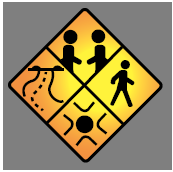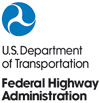FHWA Work Zone Safety and Mobility Peer-to-Peer Program
Download the Printable version: [PDF, 407 KB]
You may need the Adobe Acrobat Reader to view this PDF.
Contact Information: WorkZoneFeedback@dot.gov
| The FHWA Work Zone Peer-to-Peer (P2P) program provides short-term assistance to agencies interested in learning new methods, tools, and strategies to improve work zone safety and mobility. |
State and Local transportation agencies have access to knowledgeable peers who have expertise, lessons learned, and success stories to share. Assistance is provided at no cost to these agencies and covers a range of work zone issues.
Topics covered recently include:
- Accelerated construction to minimize traffic impacts
- Construction vehicle lighting
- Intelligent transportation system (ITS) use in work zones
- Monitoring work zone performance
- Rating maintenance of traffic proposals
- Temporary pavement markers and striping
- Temporary traffic control (alternate bid options, effectiveness of field reviews, quality of devices)
- Transportation management plan (TMP) changes during construction
- Work zone analysis and tools (capacity, impacts, crash analysis)
Peer assistance/exchange can happen in one of several ways:
- Email/phone exchanges (most common)
- Peer visit where one agency visits another to discuss a topic or view a demonstration
- Workshop where peers from several agencies and levels of expertise gather to learn and discuss a topic.
You've Got Questions
Your Peers Have Answers
The FHWA Work Zone P2P Program puts you in touch with peers from across the country who have been in your shoes. These colleagues understand your questions and can give you suggestions and options for resolving work zone issues you may come across.
 Question
Question
I'm looking for information on contractor-developed TMPs, specifically any best practices, guidance, or examples you can give.
Peer Responses
"…we have found that the most important thing you can do for a contractor developed TMP is to put a lot of time and effort in the scope. That may sound too simplistic but it is very important because the scope drives the whole process going forward."
"…I have worked on a number of design-build projects, as a member of the design-build team, to develop project-specific TIM plans so I have some insights on the effectiveness of structuring programs through the contractor. Let's talk."
"…Design/Build projects are the only area where we use contractor developed TMPs. Please find attached the Performance Requirements…"
When a question is submitted to the P2P Program, the Program Coordinator will match peers with the agency/person requesting assistance based on the topic and peer expertise.
Attend a Peer Exchange Workshop

The Work Zone P2P Program conducted a peer exchange workshop on work zone analysis and using the Construction Analysis for Pavement Rehabilitation Strategies (CA4PRS) software tool developed by the California Department of Transportation (Caltrans). The peer exchange helped peers become familiar with the role of analysis tools in planning for construction/ rehabilitation projects and with CA4PRS.
At the peer exchange, practitioners gathered input from their peers on tips, common challenges, and lessons learned about work zone analysis and CA4PRS, learned about training opportunities, shared experiences through case study presentations, and discussed ideas for improving the CA4PRS tool.
Lessons attendees were able to learn along the way included:
- Learning new tools can be challenging.
- Benefits and lessons learned information from experienced peers are important in helping practitioners to begin using new tools.
- Management buy-in helps facilitate greater use of tools such as CA4PRS.
- Incentives to try something new are typically higher on larger projects where significant traffic impacts are expected, but there is often less flexibility in construction staging for these types of projects.
- To enhance decision-making and increase the accuracy of results, the analysis should consider contractor incentives, such as for early completion.
|
Materials from recent workshops are available at: |
Visit a Peer
Peer visits provide an opportunity for more in-depth information exchange. The Work Zone P2P Program facilitated a peer exchange in Spring 2013 that brought Michigan DOT (MDOT) representatives to Minnesota DOT (MnDOT) to share their experiences with TMP development and how to decide when to make additional investments in traffic impact mitigation. MnDOT's Metro District was working on establishing delay thresholds and enhancing mitigation strategies, knew that MDOT had made great strides in those areas, and wanted to learn from them.
Agenda topics included MDOT's organizational structure, TMP development process (traffic analysis, queue/delay/level-of-service thresholds, how to decide on mitigation strategies), TMP implementation and monitoring, documentation, and roles. Michigan also shared how its processes work in practice across different districts and what challenges they have. MnDOT provided a summary of its TMP process.

Results:
Minnesota: The peer exchange led to improvements in TMP development in Minnesota.
"The peer-to-peer meeting allowed MnDOT to get information about what MDOT is doing and allowed the two agencies to discuss the challenges they face and workable solutions they have found. These discussions helped the Metro District develop a process that it is going to begin implementing this spring."
Michigan: MDOT has used the materials it developed for the peer exchange in training for its employees.
"The questions and discussion topics that took place during the peer to peer allowed MDOT to format its TMP training based on the flow and layout of the peer exchange. We got such positive feedback from the peer exchange and have received the same feedback in the first two training [sessions] that MDOT has performed."

If you have a question or want to learn about a method or tool that you don't have experience with, contact the Work Zone P2P Program:
Send an email to
workzoneP2P@dot.gov
or call toll-free at
1-866-P2P-FHWA

1200 New Jersey Avenue, SE
Washington, DC 20590
FHWA-HOP-13-045